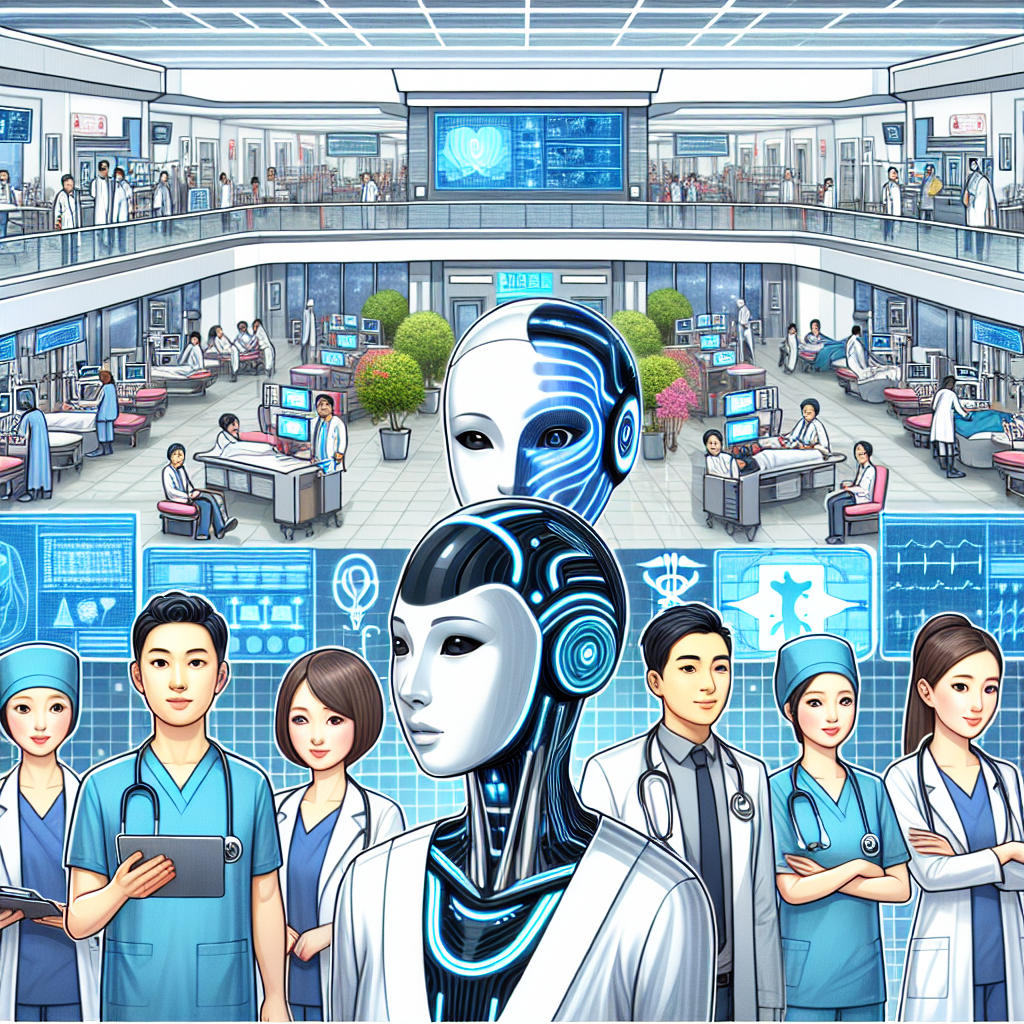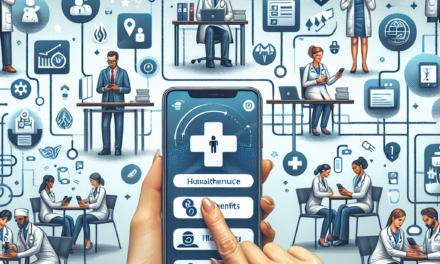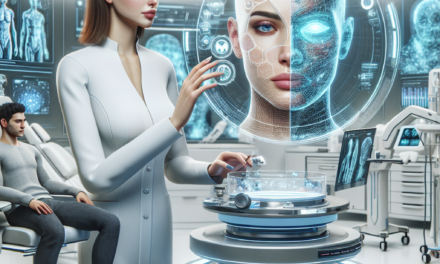Hong Kong University to Pilot Four GenAI Models in Hospitals

In a groundbreaking move, Hong Kong University (HKU) has announced the pilot of four Generative Artificial Intelligence (GenAI) models in hospitals across the region. This initiative aims to revolutionize healthcare delivery, improve patient outcomes, and streamline hospital operations. As the world grapples with the challenges of modern healthcare, the integration of AI technologies offers promising solutions. This article delves into the details of this pilot program, exploring its potential impacts, challenges, and the future of AI in healthcare.
The Role of GenAI in Modern Healthcare
Generative Artificial Intelligence, or GenAI, represents a subset of AI technologies that focus on generating new content, ideas, or solutions based on existing data. In the context of healthcare, GenAI can be leveraged to enhance diagnostic accuracy, personalize treatment plans, and optimize hospital workflows. The potential applications of GenAI in healthcare are vast and varied, offering numerous benefits to both patients and healthcare providers.
Enhancing Diagnostic Accuracy
One of the most promising applications of GenAI in healthcare is its ability to enhance diagnostic accuracy. By analyzing vast amounts of medical data, GenAI models can identify patterns and correlations that may be missed by human practitioners. This capability is particularly valuable in complex cases where traditional diagnostic methods may fall short.
For instance, GenAI can be used to analyze medical imaging data, such as X-rays, MRIs, and CT scans, to detect anomalies and suggest potential diagnoses. Studies have shown that AI models can achieve diagnostic accuracy rates comparable to, or even exceeding, those of experienced radiologists. This not only improves patient outcomes but also reduces the burden on healthcare professionals.
Personalizing Treatment Plans
Another significant advantage of GenAI in healthcare is its ability to personalize treatment plans. By analyzing a patient’s medical history, genetic information, and lifestyle factors, GenAI models can recommend tailored treatment options that are more likely to be effective. This personalized approach to medicine has the potential to improve patient outcomes and reduce the risk of adverse reactions.
For example, GenAI can be used to identify the most effective chemotherapy regimen for a cancer patient based on their unique genetic profile. This level of personalization is not possible with traditional treatment methods, which often rely on a one-size-fits-all approach.
Optimizing Hospital Workflows
In addition to improving patient care, GenAI can also be used to optimize hospital workflows. By analyzing data on patient admissions, staff schedules, and resource utilization, GenAI models can identify inefficiencies and suggest improvements. This can lead to reduced wait times, improved resource allocation, and enhanced overall hospital efficiency.
For instance, a GenAI model could predict peak times for patient admissions and suggest optimal staffing levels to ensure that patients receive timely care. This not only improves patient satisfaction but also reduces the strain on hospital staff.
Case Studies and Real-World Applications
Several hospitals and healthcare organizations around the world have already begun to implement GenAI technologies with promising results. For example, a hospital in the United States used a GenAI model to predict patient readmissions, resulting in a 20% reduction in readmission rates. Similarly, a hospital in the United Kingdom used GenAI to optimize its surgical scheduling, leading to a 15% increase in surgical throughput.
These case studies demonstrate the potential of GenAI to transform healthcare delivery and improve patient outcomes. As more hospitals adopt these technologies, the benefits are expected to become even more pronounced.
Challenges and Considerations
While the potential benefits of GenAI in healthcare are significant, there are also several challenges and considerations that must be addressed. One of the primary concerns is data privacy and security. Healthcare data is highly sensitive, and ensuring its protection is paramount. Hospitals must implement robust security measures to safeguard patient information and comply with relevant regulations.
Another challenge is the integration of GenAI technologies into existing healthcare systems. This requires significant investment in infrastructure and training for healthcare professionals. Additionally, there may be resistance to change from staff who are accustomed to traditional methods of care.
The Pilot Program: An Overview
The pilot program launched by Hong Kong University aims to address these challenges and demonstrate the potential of GenAI in healthcare. The program will involve the deployment of four GenAI models in selected hospitals across Hong Kong, with a focus on improving diagnostic accuracy, personalizing treatment plans, and optimizing hospital workflows.
Selection of Hospitals and Models
The selection of hospitals for the pilot program was based on several criteria, including their readiness to adopt new technologies, the availability of relevant data, and their commitment to improving patient care. The chosen hospitals represent a diverse range of healthcare settings, from large urban hospitals to smaller rural facilities.
The four GenAI models selected for the pilot program were chosen based on their potential to address key challenges in healthcare delivery. These models include:
- A diagnostic model for analyzing medical imaging data
- A treatment personalization model for recommending tailored treatment plans
- A workflow optimization model for improving hospital efficiency
- A predictive model for identifying patients at risk of readmission
Implementation and Training
The implementation of the GenAI models will involve several phases, including data collection, model training, and deployment. Hospitals will work closely with HKU researchers to ensure that the models are trained on high-quality data and are tailored to the specific needs of each facility.
Training for healthcare professionals will also be a key component of the pilot program. This will involve workshops and seminars to familiarize staff with the new technologies and demonstrate their potential benefits. By involving healthcare professionals in the implementation process, the program aims to foster a culture of innovation and collaboration.
Monitoring and Evaluation
The success of the pilot program will be evaluated based on several metrics, including improvements in diagnostic accuracy, patient outcomes, and hospital efficiency. Regular monitoring and evaluation will be conducted to assess the impact of the GenAI models and identify areas for improvement.
Feedback from healthcare professionals and patients will also be collected to ensure that the models are meeting their needs and expectations. This feedback will be used to refine the models and inform future iterations of the program.
Expected Outcomes and Benefits
The pilot program is expected to yield several benefits for both patients and healthcare providers. By improving diagnostic accuracy and personalizing treatment plans, the program aims to enhance patient outcomes and reduce the risk of adverse reactions. Additionally, by optimizing hospital workflows, the program is expected to improve efficiency and reduce costs.
The program also aims to demonstrate the potential of GenAI to transform healthcare delivery and pave the way for wider adoption of these technologies in hospitals across Hong Kong and beyond.
Challenges and Mitigation Strategies
While the pilot program offers significant potential benefits, there are also several challenges that must be addressed. One of the primary challenges is ensuring data privacy and security. To mitigate this risk, hospitals will implement robust security measures and comply with relevant regulations.
Another challenge is the integration of GenAI technologies into existing healthcare systems. This will require significant investment in infrastructure and training for healthcare professionals. To address this challenge, the program will provide comprehensive training and support for staff, as well as ongoing technical assistance.
Potential Impacts on Healthcare Delivery
The integration of GenAI models in hospitals has the potential to significantly impact healthcare delivery in several ways. By improving diagnostic accuracy, personalizing treatment plans, and optimizing hospital workflows, GenAI can enhance patient outcomes and improve overall hospital efficiency.
Improving Patient Outcomes
One of the most significant impacts of GenAI in healthcare is its potential to improve patient outcomes. By enhancing diagnostic accuracy and personalizing treatment plans, GenAI can help ensure that patients receive the most effective care possible. This can lead to faster recovery times, reduced risk of complications, and improved overall health outcomes.
For example, a study conducted by a hospital in the United States found that the use of a GenAI model for analyzing medical imaging data resulted in a 15% increase in diagnostic accuracy. This led to improved patient outcomes and reduced the need for additional testing and procedures.
Enhancing Hospital Efficiency
In addition to improving patient outcomes, GenAI can also enhance hospital efficiency by optimizing workflows and resource allocation. By analyzing data on patient admissions, staff schedules, and resource utilization, GenAI models can identify inefficiencies and suggest improvements. This can lead to reduced wait times, improved resource allocation, and enhanced overall hospital efficiency.
For instance, a hospital in the United Kingdom used a GenAI model to optimize its surgical scheduling, resulting in a 15% increase in surgical throughput. This not only improved patient satisfaction but also reduced the strain on hospital staff.
Reducing Healthcare Costs
The integration of GenAI in healthcare also has the potential to reduce costs by improving efficiency and reducing the need for additional testing and procedures. By enhancing diagnostic accuracy and personalizing treatment plans, GenAI can help ensure that patients receive the most effective care possible, reducing the risk of complications and the need for costly interventions.
For example, a study conducted by a hospital in the United States found that the use of a GenAI model for predicting patient readmissions resulted in a 20% reduction in readmission rates. This led to significant cost savings for the hospital and improved patient outcomes.
Fostering Innovation and Collaboration
The pilot program launched by Hong Kong University also aims to foster a culture of innovation and collaboration in healthcare. By involving healthcare professionals in the implementation process and providing comprehensive training and support, the program aims to encourage the adoption of new technologies and promote collaboration between researchers and healthcare providers.
This collaborative approach is expected to lead to the development of new and innovative solutions to healthcare challenges, paving the way for wider adoption of GenAI technologies in hospitals across Hong Kong and beyond.
Challenges and Considerations
While the potential impacts of GenAI in healthcare are significant, there are also several challenges and considerations that must be addressed. One of the primary concerns is data privacy and security. Healthcare data is highly sensitive, and ensuring its protection is paramount. Hospitals must implement robust security measures to safeguard patient information and comply with relevant regulations.
Another challenge is the integration of GenAI technologies into existing healthcare systems. This requires significant investment in infrastructure and training for healthcare professionals. Additionally, there may be resistance to change from staff who are accustomed to traditional methods of care.
Challenges and Ethical Considerations
While the potential benefits of GenAI in healthcare are significant, there are also several challenges and ethical considerations that must be addressed. These include data privacy and security, the integration of GenAI technologies into existing healthcare systems, and the potential for bias in AI models.
Data Privacy and Security
One of the primary concerns with the integration of GenAI in healthcare is data privacy and security. Healthcare data is highly sensitive, and ensuring its protection is paramount. Hospitals must implement robust security measures to safeguard patient information and comply with relevant regulations.
To address this challenge, the pilot program launched by Hong Kong University will implement several measures to ensure data privacy and security. These include encryption of patient data, access controls to limit who can view and modify data, and regular audits to ensure compliance with relevant regulations.
Integration into Existing Healthcare Systems
Another challenge is the integration of GenAI technologies into existing healthcare systems. This requires significant investment in infrastructure and training for healthcare professionals. Additionally, there may be resistance to change from staff who are accustomed to traditional methods of care.
To address this challenge, the pilot program will provide comprehensive training and support for healthcare professionals, as well as ongoing technical assistance. By involving staff in the implementation process and demonstrating the potential benefits of GenAI, the program aims to foster a culture of innovation and collaboration.
Potential for Bias in AI Models
Another ethical consideration is the potential for bias in AI models. AI models are trained on existing data, and if this data is biased, the models may produce biased results. This can lead to disparities in healthcare delivery and outcomes.
To address this challenge, the pilot program will implement measures to ensure that the GenAI models are trained on diverse and representative data. Additionally, regular audits will be conducted to identify and address any potential biases in the models.
Ensuring Transparency and Accountability
Ensuring transparency and accountability is also a key consideration in the integration of GenAI in healthcare. Patients and healthcare professionals must have confidence in the accuracy and reliability of AI models, and there must be mechanisms in place to address any concerns or issues that arise.
To address this challenge, the pilot program will implement measures to ensure transparency and accountability, including regular reporting on the performance of the GenAI models and mechanisms for feedback and complaints.
Balancing Innovation with Ethical Considerations
Balancing innovation with ethical considerations is a key challenge in the integration of GenAI in healthcare. While the potential benefits of GenAI are significant, it is important to ensure that these technologies are used responsibly and ethically.
The pilot program launched by Hong Kong University aims to address this challenge by implementing measures to ensure data privacy and security, addressing potential biases in AI models, and ensuring transparency and accountability. By balancing innovation with ethical considerations, the program aims to demonstrate the potential of GenAI to transform healthcare delivery while ensuring that patient rights and interests are protected.
The Future of GenAI in Healthcare
The pilot program launched by Hong Kong University represents a significant step forward in the integration of GenAI in healthcare. By demonstrating the potential benefits of these technologies and addressing key challenges and ethical considerations, the program aims to pave the way for wider adoption of GenAI in hospitals across Hong Kong and beyond.
Expanding the Use of GenAI in Healthcare
The success of the pilot program is expected to lead to the expansion of GenAI technologies in healthcare. As more hospitals adopt these technologies, the benefits are expected to become even more pronounced, leading to improved patient outcomes, enhanced hospital efficiency, and reduced healthcare costs.
For example, a study conducted by a hospital in the United States found that the use of a GenAI model for predicting patient readmissions resulted in a 20% reduction in readmission rates. This led to significant cost savings for the hospital and improved patient outcomes.
Developing New and Innovative Solutions
The integration of GenAI in healthcare also has the potential to lead to the development of new and innovative solutions to healthcare challenges. By fostering a culture of innovation and collaboration, the pilot program aims to encourage the development of new AI models and applications that address key challenges in healthcare delivery.
For example, a hospital in the United Kingdom used a GenAI model to optimize its surgical scheduling, resulting in a 15% increase in surgical throughput. This not only improved patient satisfaction but also reduced the strain on hospital staff.
Addressing Challenges and Ethical Considerations
While the potential benefits of GenAI in healthcare are significant, it is important to address key challenges and ethical considerations. These include data privacy and security, the integration of GenAI technologies into existing healthcare systems, and the potential for bias in AI models.
The pilot program launched by Hong Kong University aims to address these challenges by implementing measures to ensure data privacy and security, addressing potential biases in AI models, and ensuring transparency and accountability. By balancing innovation with ethical considerations, the program aims to demonstrate the potential of GenAI to transform healthcare delivery while ensuring that patient rights and interests are protected.
Paving the Way for Wider Adoption
The pilot program launched by Hong Kong University represents a significant step forward in the integration of GenAI in healthcare. By demonstrating the potential benefits of these technologies and addressing key challenges and ethical considerations, the program aims to pave the way for wider adoption of GenAI in hospitals across Hong Kong and beyond.
As more hospitals adopt these technologies, the benefits are expected to become even more pronounced, leading to improved patient outcomes, enhanced hospital efficiency, and reduced healthcare costs.
The Future of Healthcare Delivery
The integration of GenAI in healthcare represents a significant shift in the way healthcare is delivered. By leveraging the power of AI technologies, hospitals can improve patient outcomes, enhance efficiency, and reduce costs. The pilot program launched by Hong Kong University represents a significant step forward in this transformation, paving the way for wider adoption of GenAI in hospitals across Hong Kong and beyond.
As more hospitals adopt these technologies, the benefits are expected to become even more pronounced, leading to improved patient outcomes, enhanced hospital efficiency, and reduced healthcare costs. The future of healthcare delivery is bright, and GenAI is poised to play a key role in this transformation.
Conclusion
The pilot program launched by Hong Kong University to integrate four GenAI models in hospitals represents a significant step forward in the transformation of healthcare delivery. By demonstrating the potential benefits of these technologies and addressing key challenges and ethical considerations, the program aims to pave the way for wider adoption of GenAI in hospitals across Hong Kong and beyond.
The integration of GenAI in healthcare has the potential to improve patient outcomes, enhance hospital efficiency, and reduce healthcare costs. By leveraging the power of AI technologies, hospitals can provide more effective and personalized care, optimize workflows, and reduce the risk of complications.
While there are challenges and ethical considerations that must be addressed, the pilot program launched by Hong Kong University aims to demonstrate that these challenges can be overcome. By implementing measures to ensure data privacy and security, addressing potential biases in AI models, and ensuring transparency and accountability, the program aims to balance innovation with ethical considerations.
The future of healthcare delivery is bright, and GenAI is poised to play a key role in this transformation. As more hospitals adopt these technologies, the benefits are expected to become even more pronounced, leading to improved patient outcomes, enhanced hospital efficiency, and reduced healthcare costs. The pilot program launched by Hong Kong University represents a significant step forward in this transformation, paving the way for a brighter future for healthcare delivery.





